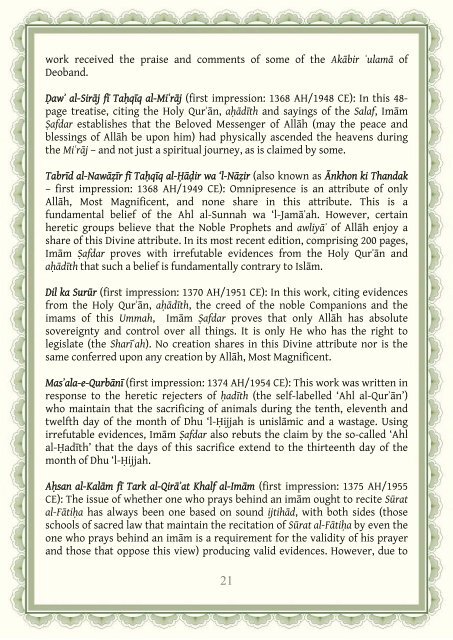You also want an ePaper? Increase the reach of your titles
YUMPU automatically turns print PDFs into web optimized ePapers that Google loves.
work received the praise and comments of some of the Akābir ʿulamā of<br />
Deoband.<br />
Ḍawʾ al-Sirāj fī Taḥqīq al-Miʿrāj (first impression: 1368 AH/1948 CE): In this 48-<br />
page treatise, citing the Holy Qurʾān, aḥādīth and sayings of the Salaf, Imām<br />
Ṣafdar establishes that the Beloved Messenger of Allāh (may the peace and<br />
blessings of Allāh be upon him) had physically ascended the heavens during<br />
the Miʿrāj – and not just a spiritual journey, as is claimed by some.<br />
Tabrīd al-Nawāẓīr fī Taḥqīq al-Ḥāḍir wa ‘l-Nāẓir (also known as Ᾱnkhon ki Thandak<br />
– first impression: 1368 AH/1949 CE): Omnipresence is an attribute of only<br />
Allāh, Most Magnificent, and none share in this attribute. This is a<br />
fundamental belief of the Ahl al-Sunnah wa ‘l-Jamāʿah. However, certain<br />
heretic groups believe that the Noble Prophets and awliyāʾ of Allāh enjoy a<br />
share of this Divine attribute. In its most recent edition, comprising 200 pages,<br />
Imām Ṣafdar proves with irrefutable evidences from the Holy Qurʾān and<br />
aḥādīth that such a belief is fundamentally contrary to Islām.<br />
Dil ka Surūr (first impression: 1370 AH/1951 CE): In this work, citing evidences<br />
from the Holy Qurʾān, aḥādīth, the creed of the noble Companions and the<br />
imams of this Ummah, Imām Ṣafdar proves that only Allāh has absolute<br />
sovereignty and control over all things. It is only He who has the right to<br />
legislate (the Sharīʿah). No creation shares in this Divine attribute nor is the<br />
same conferred upon any creation by Allāh, Most Magnificent.<br />
Masʾala-e-Qurbānī (first impression: 1374 AH/1954 CE): This work was written in<br />
response to the heretic rejecters of ḥadīth (the self-labelled ‘Ahl al-Qurʾān’)<br />
who maintain that the sacrificing of animals during the tenth, eleventh and<br />
twelfth day of the month of Dhu ‘l-Ḥijjah is unislāmic and a wastage. Using<br />
irrefutable evidences, Imām Ṣafdar also rebuts the claim by the so-called ‘Ahl<br />
al-Ḥadīth’ that the days of this sacrifice extend to the thirteenth day of the<br />
month of Dhu ‘l-Ḥijjah.<br />
Aḥsan al-Kalām fī Tark al-Qirāʾat Khalf al-Imām (first impression: 1375 AH/1955<br />
CE): The issue of whether one who prays behind an imām ought to recite Sūrat<br />
al-Fātiḥa has always been one based on sound ijtihād, with both sides (those<br />
schools of sacred law that maintain the recitation of Sūrat al-Fātiḥa by even the<br />
one who prays behind an imām is a requirement for the validity of his prayer<br />
and those that oppose this view) producing valid evidences. However, due to<br />
21














